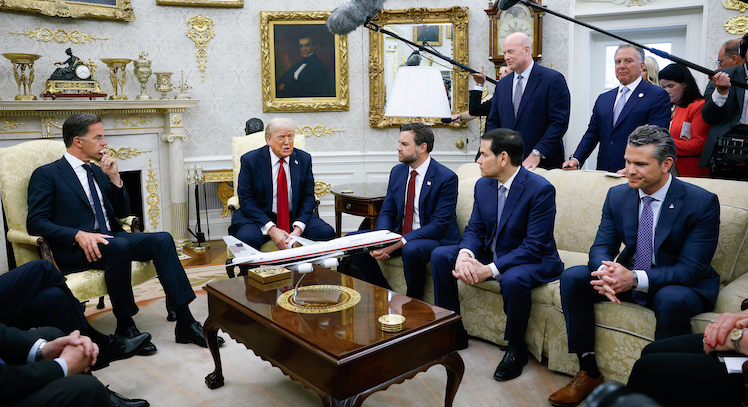At a CNN town hall during the 2016 presidential primaries, Donald Trump offered a clear window into why his stated opposition to the Iraq War was central to his campaign. “Everything that’s happening started with us stupidly going into the war in Iraq…. and people talk about me with the button. I’m the one that doesn’t want to do this, okay?”
“Running against Iraq,” so to speak, was Trump’s way of exorcising the GOP’s demons and differentiating himself from mainstream party figures. But it was also his way of pushing back on the suggestion that he was a uniquely dangerous figure. After all, he pointed out, he would never do something like invade Iraq.
That argument helped build out Trump’s intellectual base of support among the antiwar right. From there, he adopted a modified Murphy’s Law that also governed his predecessor’s foreign policy: Anything that can be Iraq, will be Iraq.
This existential fear of the expression of American military power has now dissolved. And it is fitting that Donald Trump, who rode the effects of Iraq Syndrome all the way to the presidency (twice), would be the one to cure American politics of this malady.
“This is just like Iraq” is a refrain that has been used on nearly every potential show of force since Iraq. Zero percent of those cases were actually “just like Iraq.” But of course, “just like Iraq” wasn’t meant literally; it was a hyperbolic warning intended to deliberately catastrophize the situation.
And for the most part, it worked. But it could only work until the moment it was tested. That’s when it would teach the public a different lesson.
Common sense tells us that’s exactly what happened when President Trump ordered the successful strikes on Iran’s nuclear program. Early reporting on the president’s decision to increase military aid to Ukraine appears to confirm that. From David Ignatius in the Washington Post today:
“Trump decided to escalate for three reasons, according to a source familiar with administration discussions. First, he believed that Putin was disrespecting him, feigning a readiness to make peace but ignoring the U.S. president’s call for a ceasefire. Second, he saw the efficacy of U.S. military power in the use of B-2 bombers and Tomahawk missiles against Iran. And third, he thought Putin would only negotiate if threatened with greater force. As the Russians like to say, Trump decided to ‘escalate to de-escalate.’”
Two of those three are clear violations of “just like Iraq” catastrophizing. But again, the “just like Iraq” line of thinking isn’t accurate, and now Trump realizes that.
The most hysterical version of the argument against striking Iran’s nuclear facilities was voiced by, of course, Tucker Carlson. Bombing Iran would put us at war, according to Carlson’s line of thinking, and “[t]he first week of a war with Iran could easily kill thousands of Americans. It could also collapse our economy.”
But there was no reason to believe this was a likely outcome at all. Iran had already been killing U.S. service members long before those B-2s soared above Persian skies. And Israel had already taken out Iran’s air-defense systems. The decision to strike was the equivalent of walking through an open door.
After the strikes definitively buried such scaremongering, Carlson announced he was “going to pull back from the internet a little bit.”
Good idea. Meanwhile, Trump learned an important lesson: America’s capabilities far exceed the claims of isolationist doomers. And there is a lot of room between “engage in a land war in a faraway country” and “drop a bomb from a plane on an uninhabited underground facility.”
Such limited displays of U.S. power and effectiveness are likely to do more to prevent full-scale war than removing American power from the equation entirely. Iran’s allies told it to stand down after the strikes and maybe accept a compromise with Trump; either way, they wouldn’t be taking part in any blockheaded attempt at military retribution against the United States. Take the L, as the kids say.
Ukraine is now benefiting from the Iran strikes because reality has dispelled the fog of Iraq Syndrome and the president is seeing more clearly. Asking Vladimir Putin nicely to stop the war hasn’t worked, nor should anybody have ever believed it would. Perhaps helping Ukraine defend its existence won’t stop Putin either, but at the very least it will extract higher costs than Russia is already paying for its adventurism.
Either way, there’s no denying that, in the wake of the successful strikes on Iran’s nuclear program, the president is having an easier time seeing the world as it is.

















